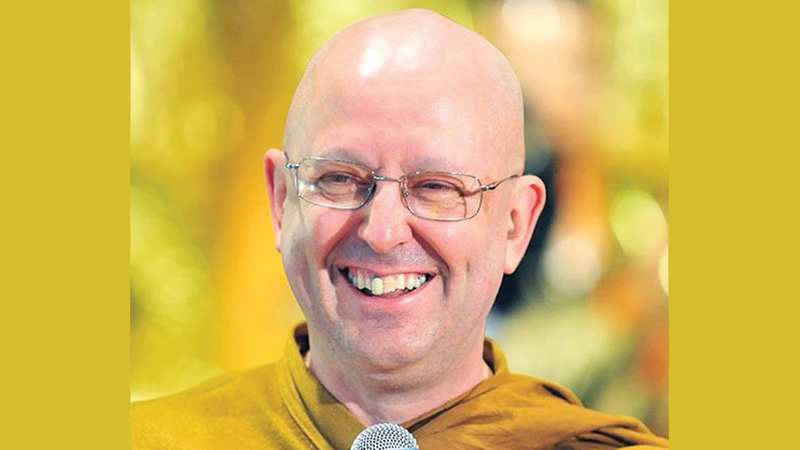Join Ajahn Brahm in Sri Lanka – May 2025
Ajahn Brahm will visit Sri Lanka in May 2025, bringing his wisdom and humour to a wider audience. He will deliver a public sermon at the BMICH on May 18. This is a rare opportunity to experience his teachings first hand and deepen your meditation practice under his guidance.
****
Ajahn Brahm begins his meditation session with a smile and a playful warning: “If you fall asleep, that’s okay, but make sure you don’t snore too loudly. We don’t want to wake up the person next to you!” He sets a light tone for the session, inviting newcomers to relax but also recognise that staying awake during meditation is a real challenge for many practitioners.
Sleepiness during meditation
Ajahn Brahm acknowledges that sleepiness is a common issue, particularly when meditating in warm weather. He humorously recalls a time when a meditator slumped over in a deep sleep during a session and jokes, “Sometimes the best meditation happens when you’re snoring!” He suggests practical tips for avoiding this, such as adjusting your posture by sitting up straighter or slightly opening your eyes to let in more light. These small changes can help keep the mind alert and focused.
Importance of present moment
“If something is important to you, you don’t fall asleep during it,” Ajahn Brahm explains, drawing a parallel to how we remain awake during thrilling moments in life, like watching an exciting film or attending an important meeting. He shares a personal story about how his own mentor would sternly ask, “What is the most important thing in the world?” The answer? This very moment.Ajahn Brahm highlights that when we truly recognise the importance of the present moment, it naturally enhances mindfulness and helps prevent the mind from drifting off.
The role of fear and necessity in maintaining mindfulness
Ajahn Brahm adds humour to this section with a story from his early days as a monk in the forest, meditating in remote areas where there were snakes. “When you’re meditating and you hear something rustling in the bushes, suddenly you’re very awake! Is it a snake? Is it coming for you?” he jokes, but the lesson is clear: mindfulness is often sharpened by the mind’s perception of urgency or necessity. While we may not have such life-threatening circumstances in our daily lives, understanding the importance of meditation for our well-being can help us stay more alert.
Treating meditation as a precious opportunity
Ajahn Brahm shares a beloved Buddhist story, “The Emperor’s Three Questions,” to emphasise that the most important time is now, the most important person is the one you are with, and the most important thing to do is to make this moment peaceful. He relates this to meditation by reminding the audience to treat each session as a precious, unrepeatable opportunity. This approach generates a sense of mindfulness and a desire to stay present.
Cultivating mental energy through presence
Ajahn Brahm introduces the idea that the present moment is a powerful source of mental energy. He recounts how even after long days of work and teaching, he can still feel energised by simply focusing on the present moment. He humourously quips, “If you’re really here in the now, there’s no space left for feeling tired. It’s amazing how much energy the now gives you!” By focusing fully on what is happening in the present, meditators can tap into this reservoir of energy and stay more awake.
Practical adjustments to maintain focus
For those struggling to stay awake, Ajahn Brahm suggests making small adjustments like moving slightly or even standing up if necessary. He shares an amusing story about a fellow monk who was determined not to fall asleep and ended up meditating while standing with his back against a wall—only to slide down slowly until he was sitting again. “Sometimes, doing something different can reset your focus,” Ajahn Brahm encourages with a chuckle, “just don’t go sliding too far down the wall!”
Embracing the ‘Now’ with full awareness
Ajahn Brahm concludes with a reminder that meditation is not about fighting sleepiness but about embracing the present with full awareness. He says, “Whether it’s drowsiness, distractions, or discomfort, these things are all part of the practice. Just bring your mind back to the now—again and again—and you’ll find the peace and energy you’re looking for.”









